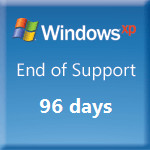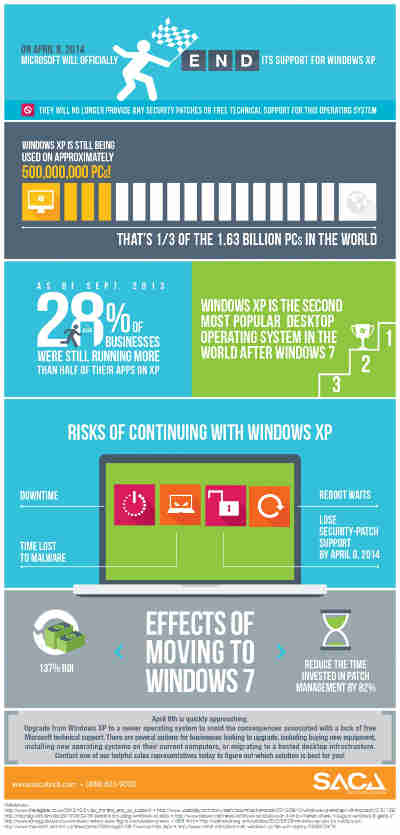| Windows XP - 96 Days Left And Counting |
| Written by Mike James |
| Wednesday, 01 January 2014 |
|
At the turn of the year the countdown to the end of XP support is particularly relevant. 2014 is the year that Windows XP dies. And on January 1st it has 96 days left...
You can argue that there should be no fuss. XP is an old operating system and anyone in their right mind should have upgraded years ago. But to what? The first OS after XP, Vista, was a flop and few wanted to upgrade. Windows 7 fixed the problem but its step up in hardware requirements makes it a poor choice for low end devices. Microsoft is pushing Windows 8 as the obvious upgrade path which many users simply don't want to use because Windows 8 is another Vista waiting to be fixed. Even the argument that XP is old isn't quite as simple as it sounds. Yes XP was released about 12 year ago and it was superseded by Vista seven years ago but XP came installed on low end hardware, typically netbooks until 2009 which means there are more viable machines running XP than you might imaging. It also means that there is more software that needs real XP than you might think - drivers are always a problem. Microsoft's attitude seems to be that after 8th April you are on your own and given that it will be possible to reverse engineer security patches for Windows 7 and Windows 8 as they are issued there will be a steady stream of zero day attacks on Windows XP - which of course will not be patched to fix the same flaws. Any XP machine connected to the internet or other source of infection is not only a danger to itself but to the other machines connected to the local network. It is reasonable to speculate that soon after support is withdrawn some malware will make XP an easy back door into the network and facilitate some sort of ransomware that will make the removal of XP essential. To sum up some of the issues take a look at the following infographic: Click for a high res version
The infographic was created by SACA Technologies who will provide advice and help in moving from Windows XP - but notice something strange. They don't mention Windows 8 but push an upgrade path to Windows 7. As already mentioned, Microsoft recommends moving to Windows 8 and doesn't mention Windows 7 as an option. In fact it mentions "Buy a new Windows 8 device" as being its first recommendation - which is understandable if a little biased towards selling its lackluster hardware and software. But Windows 7 is itself a product with a limited future. The official date for end of retail of software to upgrade an existing system has already passed - it was October 30, 2013 but you should still be able to buy a copy while stocks remain. The final date for being able to buy Window 7 preinstalled on new machines was originally announced as October 30, 2014, but Microsoft now lists it as "To be determined". However it still gives the date for the end of mainstream support as January 13, 2015 - which now seems really quite close. So what can you do? As programmers I guess that we should stop writing programs for or worrying about if our programs work on Windows XP, after all the potential market is only 500 million machines. As users I guess the only option is to take XP machines off the public internet and use them only on local networks for jobs that don't need email, a browser and the like. At this point it is usual for someone to suggest the obvious idea of moving to one flavour of Linux or another. As many XP machines are being used because of hardware or software compatibilities this is often more difficult than it sounds but in other cases Linux is a possible solution give hardware and software problems can be solved. It is also likely that some will finally realize that open source software and Linux in particular is a better choice overall because it doesn't force the obsolescence of systems simply to make a marketing point. There is also one final important point. Even those users who choose to stick with Windows XP might have trouble with re-installing it is Microsoft decides to turn off the activation servers. Windows XP was the first Microsoft OS to use activation and if Microsoft is serious about reducing its use to zero all they have to do is limit activation. While Microsoft haven't said that they are going to stop activation they haven't been reassuring on the matter either. If you want to follow the countdown to zero day you can download the Windows XP end of support countdown timer which, shock horror, only runs under Window 7 and not Windows 8. The reason is that it takes the from of a desktop gadget, something that neither Window 7 nor Windows 8 is supposed to support anymore. This is yet another marketing ploy wrapped up in a security excuse - gadgets are supposed to be inherently insecure, but they would also provide an alternative to WinRT apps in Windows 8.
More InformationSupport for Windows XP and Office 2003 ends Download the Windows XP End Of Support CountDown Gadget Related ArticlesChina Wants Extended XP Support Microsoft counts down to XP death Windows 7 Overtakes Windows XP You Can't Buy Windows 7 No More?
To be informed about new articles on I Programmer, install the I Programmer Toolbar, subscribe to the RSS feed, follow us on, Twitter, Facebook, Google+ or Linkedin, or sign up for our weekly newsletter.
Comments
or email your comment to: comments@i-programmer.info |
| Last Updated ( Wednesday, 02 April 2014 ) |



